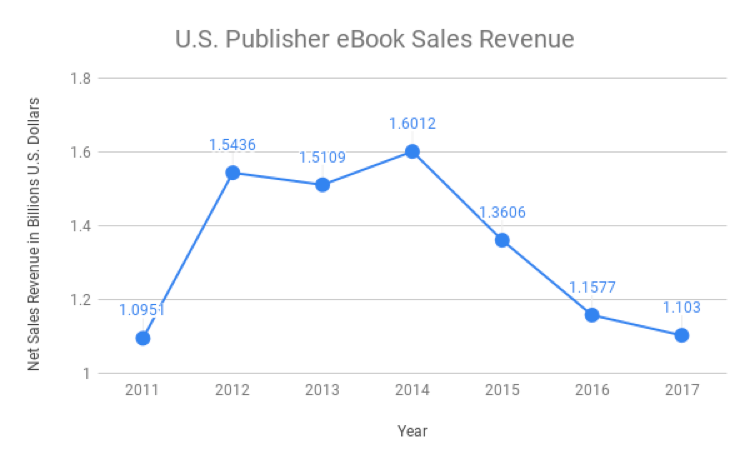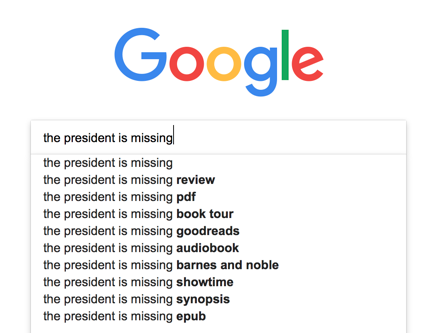How to Stop the Killing of eBooks?
How to Stop the Killing of eBooks?
Back in 2011, when Internet pioneer Marc Andreessen opined that “software is eating the world,” print publishers probably shook their heads in despair. Print publishing was one of the many traditional industries about to be disrupted by technology. So, you would expect the eBook industry to be booming right now, having devoured print the way online streaming largely replaced DVDs and CDs.
Instead, eBook sales have steadily declined over the last several years with 2017 sales falling to a seven-year low:


Authors and writers have not fared well either. According to the U.S. Bureau of Labor Statistics, the median inflation-adjusted annual income for authors and writers declined from $62,300 in 2010 to $61,800 in 2017, while the number of jobs fell from 145,900 to 131,200. In the meantime, both overall employment and income have grown on average.
Though there are many factors responsible for these trends, we must acknowledge piracy as a culprit.
Much of the blame for this lies with search engines. Google, for example, not only allows piracy to occur but may perversely even be encouraging it.
The usual way to look for an eBook is by typing the book’s title into the Google search bar. Before you even finish typing, Google will suggest additional keywords to add to your query as a part of its auto-suggest functionality. For example, searching for the current bestseller, The President is Missing,


But there is no legitimate PDF version of the book! The publisher doesn’t offer it. The only way to retrieve a PDF is through pirate websites offering downloadable counterfeit books, which is exactly where many of the results lead. Google, therefore, is priming readers to search and find counterfeit books for free via their suggested “pdf” keyword.
By pointing readers towards counterfeit books, Google effectively helps legitimize piracy, nurturing and normalizing the notion that theft is socially acceptable.
How can publishers prevent this? Legal measures have not been effective. The 1998 Digital Millennium Copyright Act (DMCA) protects internet service providers, like Google, from liability unless they fail to take down content after being notified by a copyright holder.
For publishers, DMCA is a futile game of whack-a-mole. A publisher would somehow detect that a particular pirate website shared one of thousands of their eBooks. It would post a DMCA notice to Google. Google will take its time reviewing it. By the time it acts and removes a website from search results, several new offending sites would have popped up elsewhere: it’s effortless to share a file online.
Pirates and Google portray themselves as Robin Hoods spreading access to knowledge beyond the privileged few. But, public libraries have given free access to information for centuries while not stealing from publishers and authors, and we should hold them accountable to fulfill this mission online.
Reliance on piracy is dangerously misguided: pirate-operated shadow libraries have been a source of computer viruses for decades. With the advancement of technology, we can now expect so-called deepfakes: digital materials manipulated with the help of artificial intelligence at a massive scale to advance a particular aim at a specific person. Think of eBooks automatically purged of sentences critical of Nazism or slavery. This is a subtle yet powerful way to hack a person’s mind, and create doubts about and ruin the reputation of authors and publishers.
In the meantime, stolen content gives Google and other pirate safe havens the power, a lot of short-sighted consumer goodwill, plus money from advertising to spend on lobbying. Google helped kill the Stop Online Piracy Act (SOPA), and also allegedly helped remove Maria Pallante as the head of U.S. Register of Copyrights. The European Pirate Party now has a representative in the European Parliament.
What can publishers do in the short term? Since consumers are looking for PDF eBooks, they could offer them for sale legitimately, advertising the benefit of a trusted source, and turning the problem into an opportunity. Many readers don’t want to purchase within the closed and stagnant eBook retail ecosystem dominated by Amazon that implements the “Digital Rights Management” (DRM) and limits what one can do with eBooks. For example, there’s no copy&paste from the eBook for notes. There’s no choice of a reading app. In contrast, a PDF allows that. When a pirated book is easily found online, DRM accomplishes nothing except punish legitimate consumers.
Publishers selling PDF eBooks would lead to readers finding legitimate websites rather than bootleg ones, in part because they would have a higher search engine rating.
We cannot count on Google and other search engines to solve the problem of piracy. It would lead to even more centralization. Big tech companies have not demonstrated the self-restraint that would allow us to trust them in the future.
Instead, we should support technology and platforms that empower authors, publishers, and readers instead of locking them into proprietary walled gardens. We should promote healthy competition among retailers instead of entrenching monopolies. The governments should fund the libraries to organize, monitor, archive and facilitate affordable access to digital information. The regulators should think beyond DMCA towards a model based on digital authenticity certificates.
Edward Radzivilovskiy works at Ganxy, an NYC-based internet technology company that enables publishers, authors, and creators of content to sell directly.
